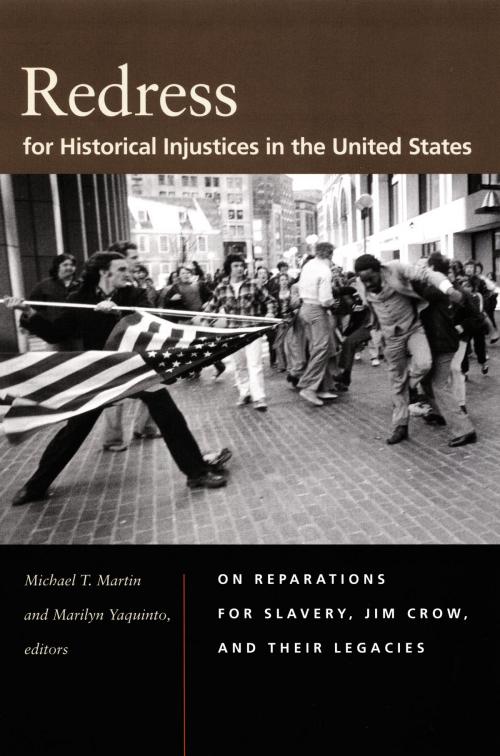Redress for Historical Injustices in the United States
On Reparations for Slavery, Jim Crow, and Their Legacies
Nonfiction, Social & Cultural Studies, Social Science, Cultural Studies, African-American Studies| Author: | David Lyons, Michael K. Brown | ISBN: | 9780822389811 |
| Publisher: | Duke University Press | Publication: | July 16, 2007 |
| Imprint: | Duke University Press Books | Language: | English |
| Author: | David Lyons, Michael K. Brown |
| ISBN: | 9780822389811 |
| Publisher: | Duke University Press |
| Publication: | July 16, 2007 |
| Imprint: | Duke University Press Books |
| Language: | English |
An exceptional resource, this comprehensive reader brings together primary and secondary documents related to efforts to redress historical wrongs against African Americans. These varied efforts are often grouped together under the rubric “reparations movement,” and they are united in their goal of “repairing” the injustices that have followed from the long history of slavery and Jim Crow. Yet, as this collection reveals, there is a broad range of opinions as to the form that repair might take. Some advocates of redress call for apologies; others for official acknowledgment of wrongdoing; and still others for more tangible reparations: monetary compensation, government investment in disenfranchised communities, the restitution of lost property and rights, and repatriation.
Written by activists and scholars of law, political science, African American studies, philosophy, economics, and history, the twenty-six essays include both previously published articles and pieces written specifically for this volume. Essays theorize the historical and legal bases of claims for redress; examine the history, strengths, and limitations of the reparations movement; and explore its relation to human rights and social justice movements in the United States and abroad. Other essays evaluate the movement’s primary strategies: legislation, litigation, and mobilization. While all of the contributors support the campaign for redress in one way or another, some of them engage with arguments against reparations.
Among the fifty-three primary documents included in the volume are federal, state, and municipal acts and resolutions; declarations and statements from organizations including the Black Panther Party and the NAACP; legal briefs and opinions; and findings and directives related to the provision of redress, from the Oklahoma Commission to Study the Tulsa Race Riot of 1921 to the mandate for the Greensboro Truth and Reconciliation Commission. Redress for Historical Injustices in the United States is a thorough assessment of the past, present, and future of the modern reparations movement.
Contributors. Richard F. America, Sam Anderson, Martha Biondi, Boris L. Bittker, James Bolner, Roy L. Brooks, Michael K. Brown, Robert S. Browne, Martin Carnoy, Chiquita Collins, J. Angelo Corlett, Elliott Currie, William A. Darity, Jr., Adrienne Davis, Michael C. Dawson, Troy Duster, Dania Frank, Robert Fullinwider, Charles P. Henry, Gerald C. Horne, Robert Johnson, Jr., Robin D. G. Kelley, Jeffrey R. Kerr-Ritchie, Theodore Kornweibel, Jr., David Lyons, Michael T. Martin, Douglas S. Massey , Muntu Matsimela , C. J. Munford, Yusuf Nuruddin, Charles J. Ogletree Jr., Melvin L. Oliver, David B. Oppenheimer, Rovana Popoff, Thomas M. Shapiro, Marjorie M. Shultz, Alan Singer, David Wellman, David R. Williams, Eric K. Yamamoto, Marilyn Yaquinto
An exceptional resource, this comprehensive reader brings together primary and secondary documents related to efforts to redress historical wrongs against African Americans. These varied efforts are often grouped together under the rubric “reparations movement,” and they are united in their goal of “repairing” the injustices that have followed from the long history of slavery and Jim Crow. Yet, as this collection reveals, there is a broad range of opinions as to the form that repair might take. Some advocates of redress call for apologies; others for official acknowledgment of wrongdoing; and still others for more tangible reparations: monetary compensation, government investment in disenfranchised communities, the restitution of lost property and rights, and repatriation.
Written by activists and scholars of law, political science, African American studies, philosophy, economics, and history, the twenty-six essays include both previously published articles and pieces written specifically for this volume. Essays theorize the historical and legal bases of claims for redress; examine the history, strengths, and limitations of the reparations movement; and explore its relation to human rights and social justice movements in the United States and abroad. Other essays evaluate the movement’s primary strategies: legislation, litigation, and mobilization. While all of the contributors support the campaign for redress in one way or another, some of them engage with arguments against reparations.
Among the fifty-three primary documents included in the volume are federal, state, and municipal acts and resolutions; declarations and statements from organizations including the Black Panther Party and the NAACP; legal briefs and opinions; and findings and directives related to the provision of redress, from the Oklahoma Commission to Study the Tulsa Race Riot of 1921 to the mandate for the Greensboro Truth and Reconciliation Commission. Redress for Historical Injustices in the United States is a thorough assessment of the past, present, and future of the modern reparations movement.
Contributors. Richard F. America, Sam Anderson, Martha Biondi, Boris L. Bittker, James Bolner, Roy L. Brooks, Michael K. Brown, Robert S. Browne, Martin Carnoy, Chiquita Collins, J. Angelo Corlett, Elliott Currie, William A. Darity, Jr., Adrienne Davis, Michael C. Dawson, Troy Duster, Dania Frank, Robert Fullinwider, Charles P. Henry, Gerald C. Horne, Robert Johnson, Jr., Robin D. G. Kelley, Jeffrey R. Kerr-Ritchie, Theodore Kornweibel, Jr., David Lyons, Michael T. Martin, Douglas S. Massey , Muntu Matsimela , C. J. Munford, Yusuf Nuruddin, Charles J. Ogletree Jr., Melvin L. Oliver, David B. Oppenheimer, Rovana Popoff, Thomas M. Shapiro, Marjorie M. Shultz, Alan Singer, David Wellman, David R. Williams, Eric K. Yamamoto, Marilyn Yaquinto















